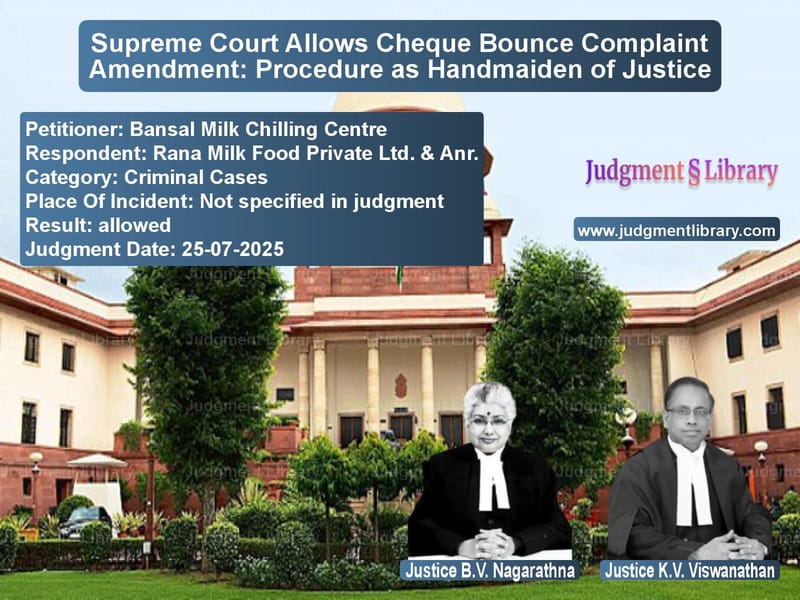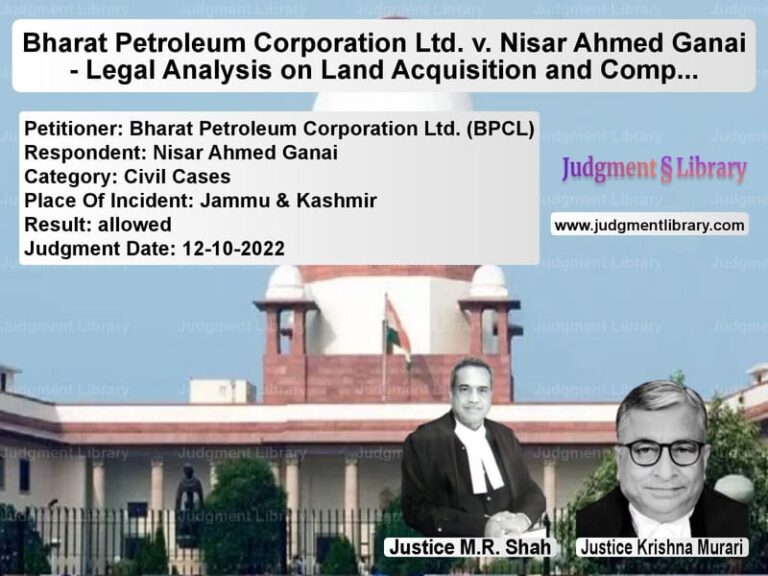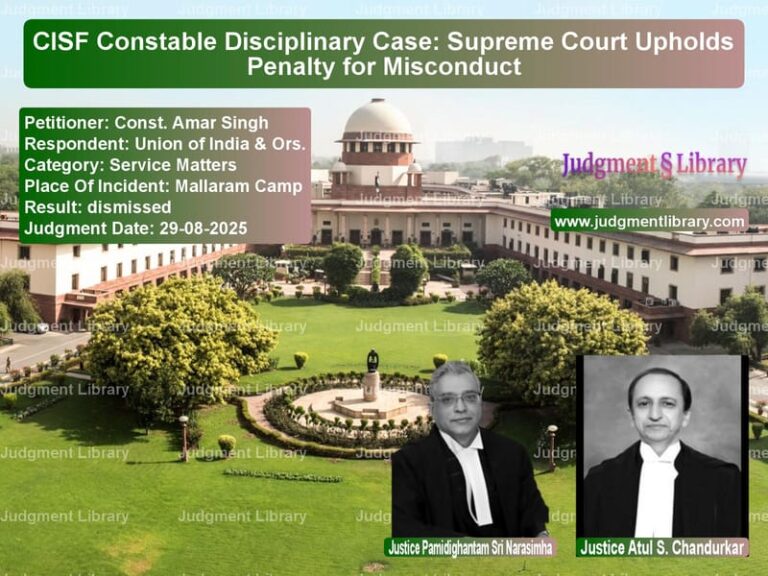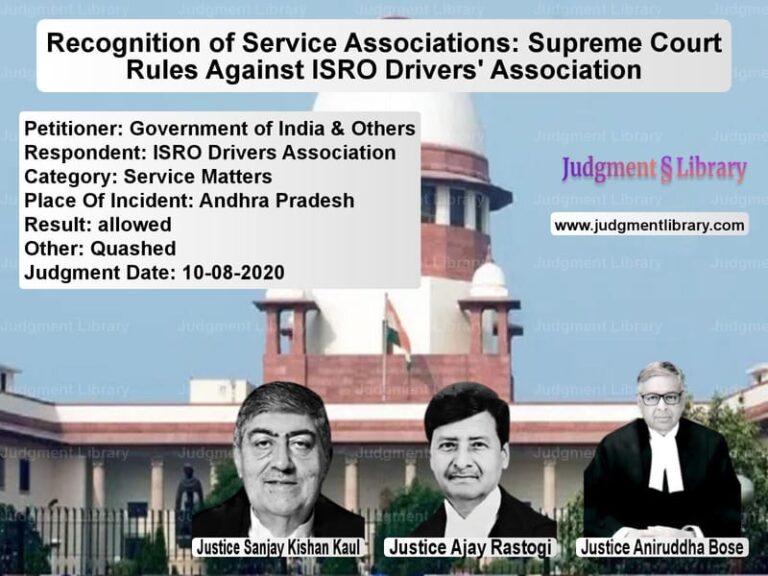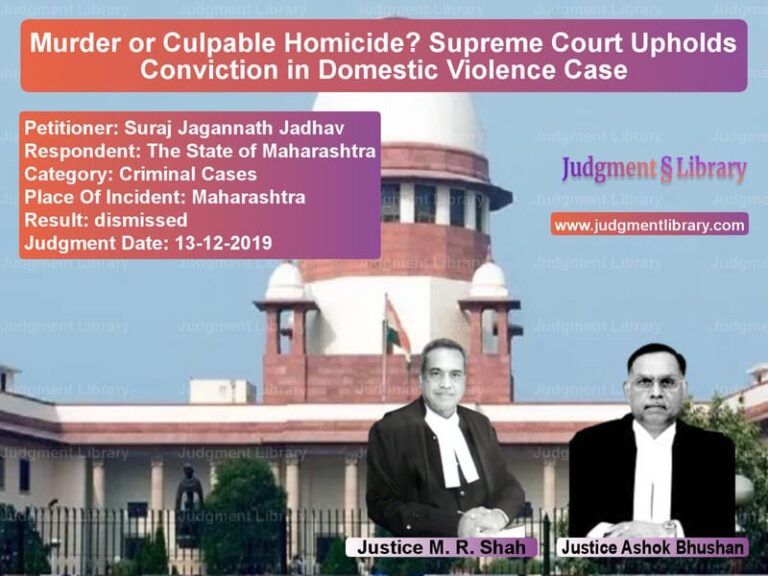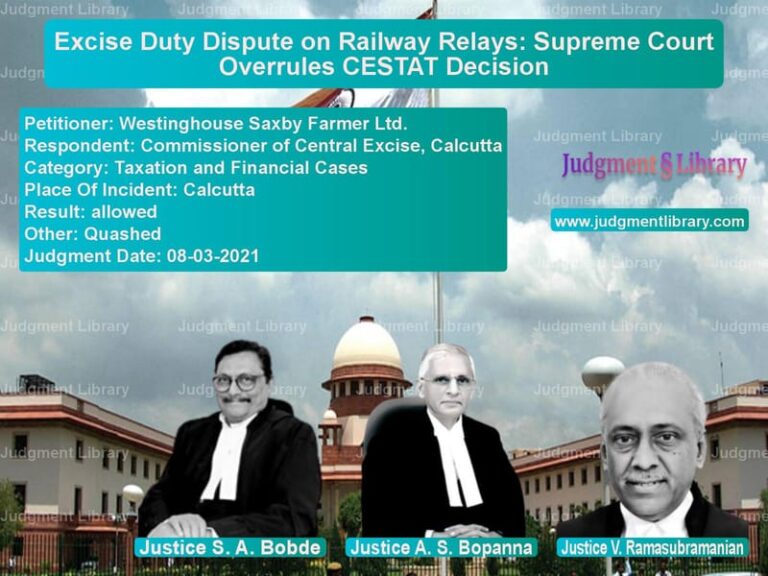Supreme Court Allows Cheque Bounce Complaint Amendment: Procedure as Handmaiden of Justice
In a significant ruling that emphasizes substance over technicalities, the Supreme Court of India has restored the right of a complainant to amend a cheque bounce case, observing that ‘procedure is only a handmaiden and not a mistress of justice.’ The judgment, delivered on July 25, 2025, brings relief to countless litigants trapped in procedural technicalities while dealing with cases under the Negotiable Instruments Act.
The legal battle began when Bansal Milk Chilling Centre filed a complaint under Section 138 of the Negotiable Instruments Act against Rana Milk Food Private Ltd. The case involved three dishonored cheques totaling Rs. 14 lakhs for transactions involving milk products. At the heart of the dispute was a simple typographical error that snowballed into a two-year legal battle.
The appellant, Bansal Milk Chilling Centre, had mistakenly mentioned in both the legal notice and complaint that the respondents had purchased ‘Desi Ghee (milk products)’ when the actual transaction involved ‘milk.’ When this error was discovered, the appellant moved an application to amend the complaint at a stage when the complainant’s chief examination had concluded but cross-examination was still pending.
The Trial Court, in its order dated September 2, 2023, allowed the amendment application, observing that since the complainant was yet to be cross-examined, no prejudice would be caused to the accused. The court rightly recognized that the amendment was merely correcting a typographical error at an initial stage of the case.
However, the respondents challenged this order before the High Court under Section 482 of CrPC. They vehemently argued that the amendment was not a typographical error since even the pre-litigation legal notice mentioned ‘Desi Ghee (milk products).’ They further contended that the amendment was an attempt to avoid liability under the Goods and Services Tax Act, as no GST is leviable on milk.
The High Court, in its impugned order, allowed the respondents’ petition, holding that the amendment sought was not merely a typographical error but had wider implications on the entire dispute and therefore changed the nature of the complaint. The High Court also found merit in the respondents’ GST-related arguments.
Before the Supreme Court, the appellants argued that the amendment was necessary to correct a genuine error and that no prejudice would be caused to the respondents since the trial was at a preliminary stage. The respondents, on the other hand, reiterated their stand that post-cognizance amendments to complaints are not permissible and that the amendment would change the fundamental nature of the case.
The Supreme Court, in its landmark judgment, extensively discussed the legal position regarding amendments to criminal complaints. The court referred to its earlier decision in S.R. Sukumar v. S. Sunaad Raghuvam, where it was held: “What is discernible from U.P. Pollution Control Board case is that an easily curable legal infirmity could be cured by means of a formal application for amendment. If the amendment sought to be made relates to a simple infirmity which is curable by means of a formal amendment and by allowing such amendment, no prejudice could be caused to the other side, notwithstanding the fact that there is no enabling provision in the Code for entertaining such amendment, the court may permit such an amendment to be made. On the contrary, if the amendment sought to be made in the complaint does not relate either to a curable infirmity or the same cannot be corrected by a formal amendment or if there is likelihood of prejudice to the other side, then the court shall not allow such amendment in the complaint.”
The respondents tried to distinguish the S.R. Sukumar case by arguing that it involved a pre-cognizance stage amendment. However, the Supreme Court rejected this submission, noting that “it is fallacious to contend that in no circumstance can amendments to complaints be allowed after cognizance is taken.”
The court also referred to the landmark judgment in U.P. Pollution Control Board vs. Modi Distillery, where it was observed: “It would be a travesty of justice if the big business house of Modi Industries Limited is allowed to defeat the prosecution launched and avoid facing the trial on a technical flaw which is not incurable for their alleged deliberate and wilful breach of the provisions.”
Justice Viswanathan, writing for the bench, emphasized that “amendments/alterations are not alien to the Code of Criminal Procedure.” The court drew parallels with Section 216 of CrPC, which deals with the power of court to alter charges, and noted that “the test of ‘prejudice to the accused’ is the cardinal factor that needs to be borne in mind.”
Read also: https://judgmentlibrary.com/cheque-bounce-case-jurisdiction-supreme-court-clarifies-legal-position/
On examining the facts of the case, the Supreme Court found that “absolutely no prejudice would be caused to the accused/respondents” since the amendment was moved at a stage when only the chief examination of the complainant had concluded and cross-examination was still pending. The court observed that “the actual facts will have to be thrashed out at the trial” and “as to what impact the amendment will have on the existence of debt or other liability is for the Trial Court to decide based on the evidence.”
The Supreme Court strongly criticized the High Court for delving into GST-related aspects, noting that “the High Court completely mis-directed itself in delving into the aspects of leviability of GST which would be the concern of the appropriate authorities under the relevant statute.” The court clarified that “it could also not be said that the amendment altered the nature and character of the complaint.”
In its concluding remarks, the court restored the Trial Court’s order allowing the amendment and directed expeditious disposal of the case. The judgment serves as an important reminder that technicalities should not defeat substantive justice, especially when no prejudice is caused to the opposite party.
This ruling has far-reaching implications for countless cheque bounce cases pending across the country, where minor errors in complaints often lead to prolonged litigation. The Supreme Court’s emphasis on justice over procedural technicalities reinforces the fundamental principle that law exists to serve justice, not to obstruct it.
The judgment also provides much-needed clarity on the scope of amendments in criminal complaints, particularly in cases under the Negotiable Instruments Act. By distinguishing between amendments that cause prejudice and those that merely correct clerical errors, the court has struck a balance between the rights of complainants and the protection available to accused persons.
As the Supreme Court rightly observed, procedure is indeed only a handmaiden of justice, and this judgment ensures that it remains so, rather than becoming an obstacle in the delivery of justice. The ruling will undoubtedly help streamline the disposal of cheque bounce cases and reduce unnecessary litigation over technical errors that don’t affect the merits of the case.
Petitioner Name: Bansal Milk Chilling Centre.Respondent Name: Rana Milk Food Private Ltd. & Anr..Judgment By: Justice B.V. Nagarathna, Justice K.V. Viswanathan.Place Of Incident: Not specified in judgment.Judgment Date: 25-07-2025.Result: allowed.
Don’t miss out on the full details! Download the complete judgment in PDF format below and gain valuable insights instantly!
Download Judgment: bansal-milk-chilling-vs-rana-milk-food-priva-supreme-court-of-india-judgment-dated-25-07-2025.pdf
Directly Download Judgment: Directly download this Judgment
See all petitions in Cheque Dishonour Cases
See all petitions in Fraud and Forgery
See all petitions in Contract Disputes
See all petitions in Debt Recovery
See all petitions in Other Cases
See all petitions in Judgment by B.V. Nagarathna
See all petitions in Judgment by K.V. Viswanathan
See all petitions in allowed
See all petitions in supreme court of India judgments July 2025
See all petitions in 2025 judgments
See all posts in Criminal Cases Category
See all allowed petitions in Criminal Cases Category
See all Dismissed petitions in Criminal Cases Category
See all partially allowed petitions in Criminal Cases Category

